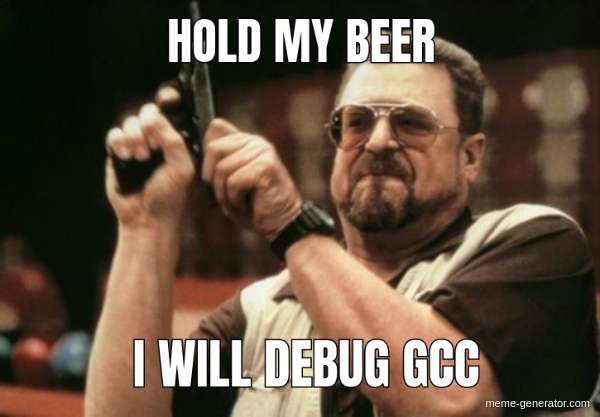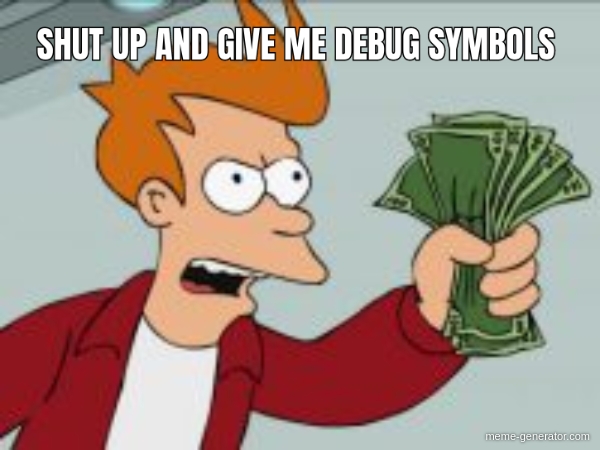So near and yet so far: Cross compiler debugging war-story
That is a short funny article that I decided to write after two days (and nights) of amazingly painful and hilarious debugging of a cross compiler.
Intro
Two years ago I was working on porting STACKLEAK security feature from Grsecurity/PaX into the Linux kernel mainline. The feature has landed in v4.20, but without detecting Stack Clash attack against Linux kernel. That functionality was not needed because during discussion of the patch series, the maintainers decided to remove all Variable Length Arrays (VLA) from the mainline kernel. Kees Cook with a team of kernel developers participated in that big cleanup. Now it is finished and the kernel is built with -Wvla, so alloca() is prohibited in the kernel, which is nice.
Currently I'm working on a patch series that improves the STACKLEAK gcc plugin in the mainline. Among other things, I've made the stack tracking instrumentation simpler, dropped searching for alloca() and added this assertion:
/* Variable Length Arrays (VLAs) are forbidden in the kernel */
gcc_assert(!cfun->calls_alloca);
Testing gcc plugins for Linux kernel is a big headache, since the kernel can be built with any gcc version starting from gcc-4.6! That is why I've created the kernel-build-containers project that provides Docker containers for handy building of Linux kernel (or other software) with various compilers for various architectures.
Last Friday evening I started the final testing of my STACKLEAK improvements and launched kernel compilation in kernel-build-containers. But next morning I was really confused by the results:
| gcc-4.8 | gcc-5 | gcc-6 | gcc-7 | gcc-8 | gcc-9 | gcc-10 | |
|---|---|---|---|---|---|---|---|
build for x86_64 |
OK | OK | OK | OK | OK | OK | OK |
cross build for arm64 |
gcc plugins not supported | assertion failed | assertion failed | OK | OK | OK | OK |
cross build for i386 |
OK | OK | OK | OK | OK | OK | OK |
Looks easy!
So my assertion failed for gcc before version 7 only for arm64. At first I thought: "Not a big problem! I know what to do: simply debug the compiler using gdb. I did it several times before. Easy!"

Okay. Sunday night… So quiet around (kids are sleeping)… Time to get some drink and build a compiler with debug symbols and then quickly find the issue in the morning. Huh, not so easy. And the painful fun began.
I needed a cross compiler that builds the kernel for arm64 on my x86_64 machine. There are many nice tutorials about creating it, for example this and this and that. I struggled with them for several hours, but failed. Making libgcc was missing various headers every time. Finally a nice idea crossed my tired mind: give up and just install debug symbols for the cross compiler package in the build container, so easy! Nice, I went to sleep satisfied with that.
Give me debug symbols!
On Monday morning I started an interactive shell in the container, going to install debug symbols for gcc-6-aarch64-linux-gnu:
$ sh run_container.sh gcc-6 ~/linux/linux/ ~/linux/build_out/
Hey, we gonna use sudo for running docker
Starting "kernel-build-container:gcc-6"
Source code directory "/home/a13x/linux/linux/" is mounted at "~/src"
Build output directory "/home/a13x/linux/build_out/" is mounted at "~/out"
Gonna run interactive bash...
The kernel-build-containers are based on Ubuntu, so I followed the how-to in Ubuntu Debug Symbol Packages documentation…
Fail! No luck! Ubuntu doesn't provide gcc-6-aarch64-linux-gnu-dbgsym package. There is no debug symbol package for any gcc cross compiler for aarch64 at http://ddebs.ubuntu.com. Grrr, not funny. I decided to try the same on Fedora. But how to install old gcc-6 on my relatively fresh Fedora 31? Oh, that is a pain. You usually need to search for the desired package and its dependencies at some RPM search engines, download them… No!

So I wrote a Docker file with ancient Fedora 24 that goes with gcc-6 out of the box:
FROM fedora:24 as base
RUN dnf -y update && \
dnf -y install gcc gcc-c++ gcc-aarch64-linux-gnu gcc-c++-aarch64-linux-gnu gcc-plugin-devel \
gcc-gdb-plugin libgcc sudo flex bison make git ctags ncurses-devel openssl-devel
ARG UNAME
ARG UID
ARG GID
RUN groupadd -g ${GID} -o ${UNAME} && \
useradd -u $UID -g $GID -ms /bin/bash ${UNAME} && \
echo "${UNAME} ALL=(ALL) NOPASSWD: ALL" >> /etc/sudoers
USER ${UNAME}
WORKDIR /home/${UNAME}/src
CMD ["bash"]
Yeah, the container worked. Now getting debug symbols for a package should be easy as:
$dnf debuginfo-install gcc-aarch64-linux-gnu
What?! It failed! Fedora doesn't provide the debuginfo for the cross compiler, it only has gcc-base-debuginfo for regular gcc-6. So near and yet so far :(
Building cross compiler: second try
Back in 2012 I was an embedded kernel developer. These good old days still remind me that toolchains are complicated. So I decided not to try building the cross compiler myself again, but use the knowledge of real experts in that area. From Open Source Summit I remembered that Thomas Petazzoni at Bootlin told that the Buildroot project can create a toolchain in addition to the kernel and file system of an embedded device. So I found the buildroot-toolchains project, cloned and started to learn it.
The configuring looked quite straightforward. Buildroot uses kconfig, just like the Linux kernel. So I took a Buildroot config fragment from a similar toolchain and changed these options:
BR2_ENABLE_DEBUG=y
BR2_DEBUG_2=y
# BR2_STRIP_strip is not set
BR2_OPTIMIZE_G=y
BR2_GCC_VERSION_6_X=y
BR2_GCC_VERSION="6.4.0"
Then I invoked make, but building failed with error. Oh! It turned out that default master branch of buildroot-toolchains repository is out-of-date. On the other hand, the fresh toolchains.bootlin.com-2020.02 branch doesn't support old gcc-6. Finally I determined that stable branch both works and supports gcc-6. It built the toolchain! But gcc was built without debug symbols. But why BR2_ENABLE_DEBUG didn't work?
I found that BR2_ENABLE_DEBUG config option is only about target Buildroot packages. But toolchain is a host package. So I hacked the Makefile a little bit and got the cross compiler with debug symbols:
diff --git a/package/gcc/gcc-final/gcc-final.mk b/package/gcc/gcc-final/gcc-final.mk
index dfad3d3110..76a9dd8bbf 100644
--- a/package/gcc/gcc-final/gcc-final.mk
+++ b/package/gcc/gcc-final/gcc-final.mk
@@ -42,7 +42,7 @@ HOST_GCC_FINAL_PRE_CONFIGURE_HOOKS += HOST_GCC_CONFIGURE_SYMLINK
define HOST_GCC_FINAL_CONFIGURE_CMDS
(cd $(HOST_GCC_FINAL_SRCDIR) && rm -rf config.cache; \
$(HOST_CONFIGURE_OPTS) \
- CFLAGS="$(HOST_CFLAGS)" \
+ CFLAGS="$(HOST_CFLAGS) -g3 -O0" \
LDFLAGS="$(HOST_LDFLAGS)" \
$(HOST_GCC_FINAL_CONF_ENV) \
./configure \
The main achievement: Buildroot produced aarch64-buildroot-linux-gnu-gcc and aarch64-buildroot-linux-gnu-g++ with gcc plugin support, which I really needed. I was sitting at the kitchen on late Monday night and laughing happily :)
GCC & GDB: practical example
I added this new toolchain to $PATH and tried to cross-compile the kernel with STACKLEAK improvements:
$ make ARCH=arm64 CROSS_COMPILE=aarch64-buildroot-linux-gnu-
The assertion failed again, the bug was reproduced:
*** WARNING *** there are active plugins, do not report this as a bug unless you can reproduce it without enabling any plugins.
Event | Plugins
PLUGIN_START_UNIT | stackleak_plugin
arch/arm64/kernel/perf_event.c: In function ‘armv8pmu_handle_irq’:
arch/arm64/kernel/perf_event.c:728:1: internal compiler error: in stackleak_cleanup_execute, at scripts/gcc-plugins/stackleak_plugin.c:390
}
^
0x7fffea99a819 stackleak_cleanup_execute
scripts/gcc-plugins/stackleak_plugin.c:390
0x7fffea99a819 execute
scripts/gcc-plugins/gcc-generate-rtl-pass.h:127
From then I knew what to do. First, I rebuilt the kernel with V=1 argument. It allowed to show the gcc invocation command that failed:
aarch64-buildroot-linux-gnu-gcc -Wp,-MD,arch/arm64/kernel/.perf_event.o.d -nostdinc -isystem /home/a13x/Develop_local/linux/build_out/toolchain/bin/../lib/gcc/aarch64-buildroot-linux-gnu/6.4.0/include -I./arch/arm64/include -I./arch/arm64/include/generated -I./include -I./arch/arm64/include/uapi -I./arch/arm64/include/generated/uapi -I./include/uapi -I./include/generated/uapi -include ./include/linux/kconfig.h -include ./include/linux/compiler_types.h -D__KERNEL__ -mlittle-endian -DKASAN_SHADOW_SCALE_SHIFT=3 -Wall -Wundef -Werror=strict-prototypes -Wno-trigraphs -fno-strict-aliasing -fno-common -fshort-wchar -fno-PIE -Werror=implicit-function-declaration -Werror=implicit-int -Wno-format-security -std=gnu89 -mgeneral-regs-only -fno-asynchronous-unwind-tables -Wno-psabi -mabi=lp64 -DKASAN_SHADOW_SCALE_SHIFT=3 -fno-delete-null-pointer-checks -Wno-frame-address -O2 --param=allow-store-data-races=0 -fplugin=./scripts/gcc-plugins/stackleak_plugin.so -DSTACKLEAK_PLUGIN -fplugin-arg-stackleak_plugin-track-min-size=100 -fplugin-arg-stackleak_plugin-arch=arm64 -fplugin-arg-stackleak_plugin-verbose -Wframe-larger-than=2048 -fstack-protector-strong -Wno-unused-but-set-variable -Wno-unused-const-variable -fno-omit-frame-pointer -fno-optimize-sibling-calls -fno-var-tracking-assignments -g -Wdeclaration-after-statement -Wvla -Wno-pointer-sign -Wno-array-bounds -Wno-maybe-uninitialized -fno-strict-overflow -fno-merge-all-constants -fmerge-constants -fno-stack-check -fconserve-stack -Werror=date-time -Werror=incompatible-pointer-types -Werror=designated-init -DKBUILD_MODFILE='"arch/arm64/kernel/perf_event"' -DKBUILD_BASENAME='"perf_event"' -DKBUILD_MODNAME='"perf_event"' -c -o arch/arm64/kernel/perf_event.o arch/arm64/kernel/perf_event.c
In fact aarch64-buildroot-linux-gnu-gcc is not a compiler itself, that is only a wrapper. Hence for debugging with gdb we need a special trick: adding -wrapper gdb,--args at the end of this command. Here is my debugging session:
- GDB says that debug symbols are found:
GNU gdb (GDB) Fedora 8.3.50.20190824-30.fc31 ... Reading symbols from libexec/gcc/aarch64-buildroot-linux-gnu/6.4.0/cc1... - Request the breakpoint near my gcc pass:
(gdb) break execute_fixup_cfg() Breakpoint 1 at 0x9882c0 - Run the compiler:
(gdb) run Breakpoint 1, 0x00000000009882c0 in execute_fixup_cfg() () - Which source code function is currently compiled?
(gdb) p current_function_decl->decl_minimal.name->identifier.id.str $11 = (const unsigned char *) 0x7fffe9b7d3b0 "get_irq_regs" - Set the watchpoint for the action that will later break the assertion:
(gdb) watch -l ((struct function *)cfun)->calls_alloca Hardware watchpoint 2: -location ((struct function *)cfun)->calls_alloca - Show the breakpoints, delete the unneeded one and continue:
(gdb) info breakpoints Num Type Disp Enb Address What 1 breakpoint keep y 0x00000000009882c0 <execute_fixup_cfg()> breakpoint already hit 21 times 2 hw watchpoint keep y -location ((struct function *)cfun)->calls_alloca (gdb) delete breakpoints 1 (gdb) c Continuing. - Get the bug!
Hardware watchpoint 3: -location ((struct function *)cfun)->calls_alloca Old value = 0 New value = 1 0x00000000006cad6f in allocate_dynamic_stack_space(rtx_def*, unsigned int, unsigned int, bool) () (gdb) p current_function_decl->decl_minimal.name->identifier.id.str $81 = (const unsigned char *) 0x7fffe7456d98 "armv8pmu_handle_irq" (gdb) bt #0 0x00000000006cad6f in allocate_dynamic_stack_space(rtx_def*, unsigned int, unsigned int, bool) () #1 0x0000000000603a84 in expand_stack_vars(bool (*)(unsigned long), stack_vars_data*) () #2 0x000000000060e235 in expand_used_vars() () #3 0x000000000060fbf4 in (anonymous namespace)::pass_expand::execute(function*) () #4 0x00000000008ac0c2 in execute_one_pass(opt_pass*) () #5 0x00000000008ac668 in execute_pass_list_1(opt_pass*) () #6 0x00000000008ac6c9 in execute_pass_list(function*, opt_pass*) () #7 0x0000000000639a1f in cgraph_node::expand() () #8 0x000000000063af45 in symbol_table::compile() [clone .part.0] () #9 0x000000000063c96b in symbol_table::finalize_compilation_unit() () #10 0x0000000000958651 in compile_file() () #11 0x0000000000520b29 in toplev::main(int, char**) () #12 0x0000000000522a60 in main ()
Here expand_stack_vars() calls allocate_dynamic_stack_space() that sets cfun->calls_alloca for functions that in fact don't call alloca(). I searched in gcc repository history for changes in expand_stack_vars() implementation and found the commit fixing that strange behaviour in gcc-7:
commit 7072df0aae0c59ae437e5cc28e4e5e5777e930ba
Author: Dominik Vogt <vogt@linux.vnet.ibm.com>
Date: Mon Jul 18 13:10:27 2016 +0000
Allocate constant size dynamic stack space in the prologue
The attached patch fixes a warning during Linux kernel compilation
on S/390 due to -mwarn-dynamicstack and runtime alignment of stack
variables with constant size causing cfun->calls_alloca to be set
(even if alloca is not used at all). The patched code places
constant size runtime aligned variables in the "virtual stack
vars" area instead of creating a "virtual stack dynamic" area.
This behaviour is activated by defining
#define ALLOCATE_DYNAMIC_STACK_SPACE_IN_PROLOGUE 1
Ha-ha! It was fixing another warning during Linux kernel compilation back in 2016. That it funny.
Conclusion
In Russia we have an idiom "близок локоток, да не укусишь" that can be translated like "your elbow is near, but you can't bite it, dear". That debugging was painful, thanks God, I managed to make this "bite". Writing this article helped me to relax. Hope you enjoyed reading!
